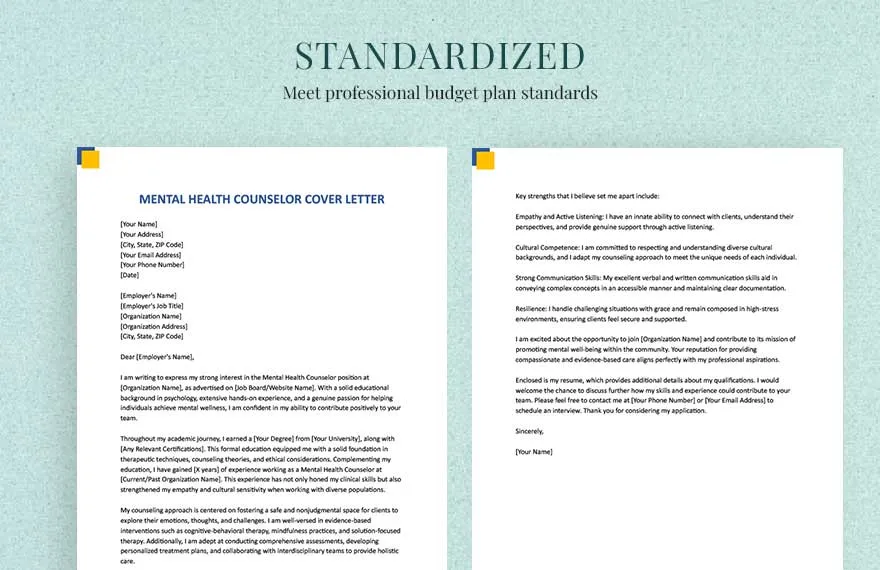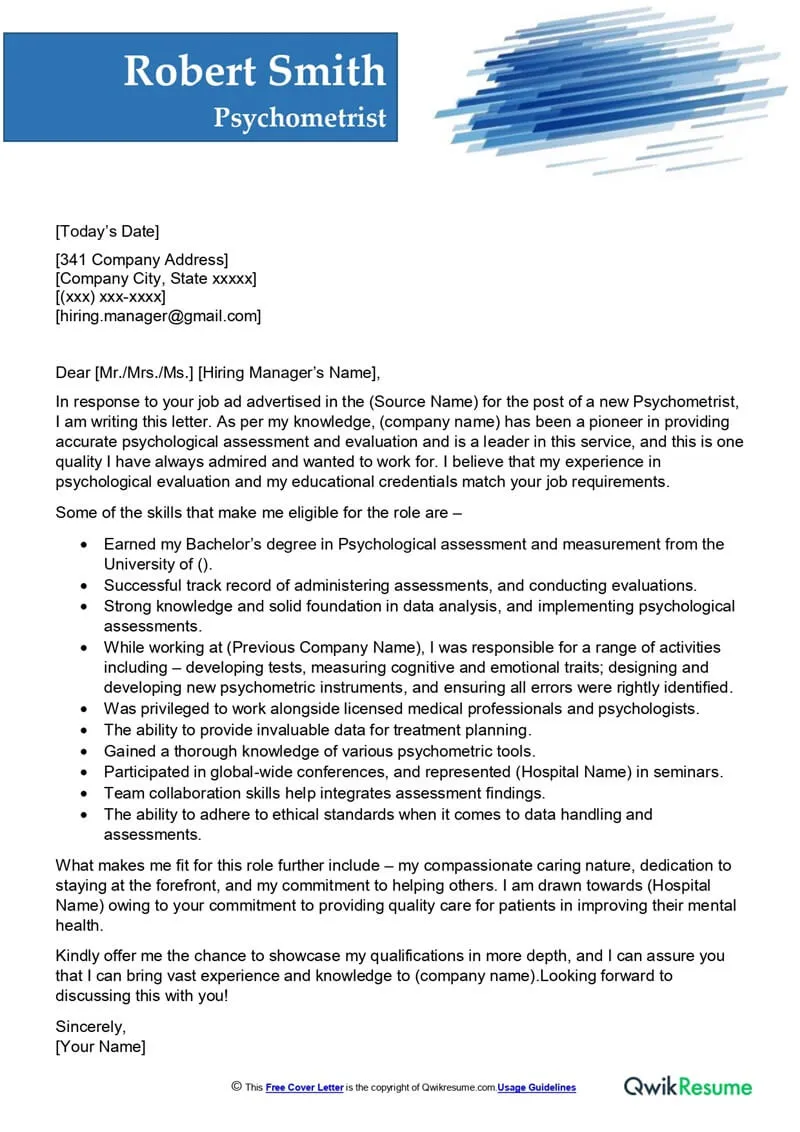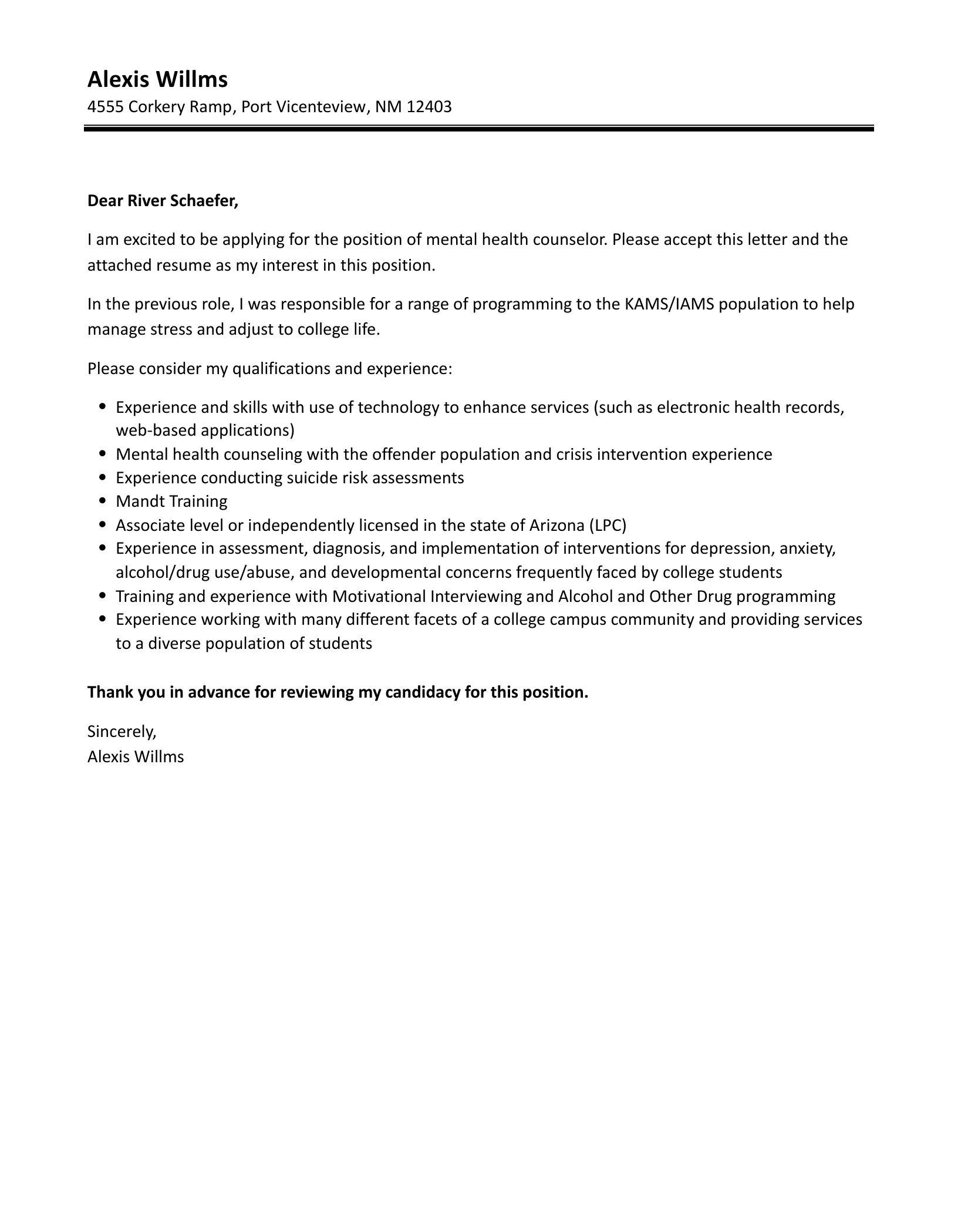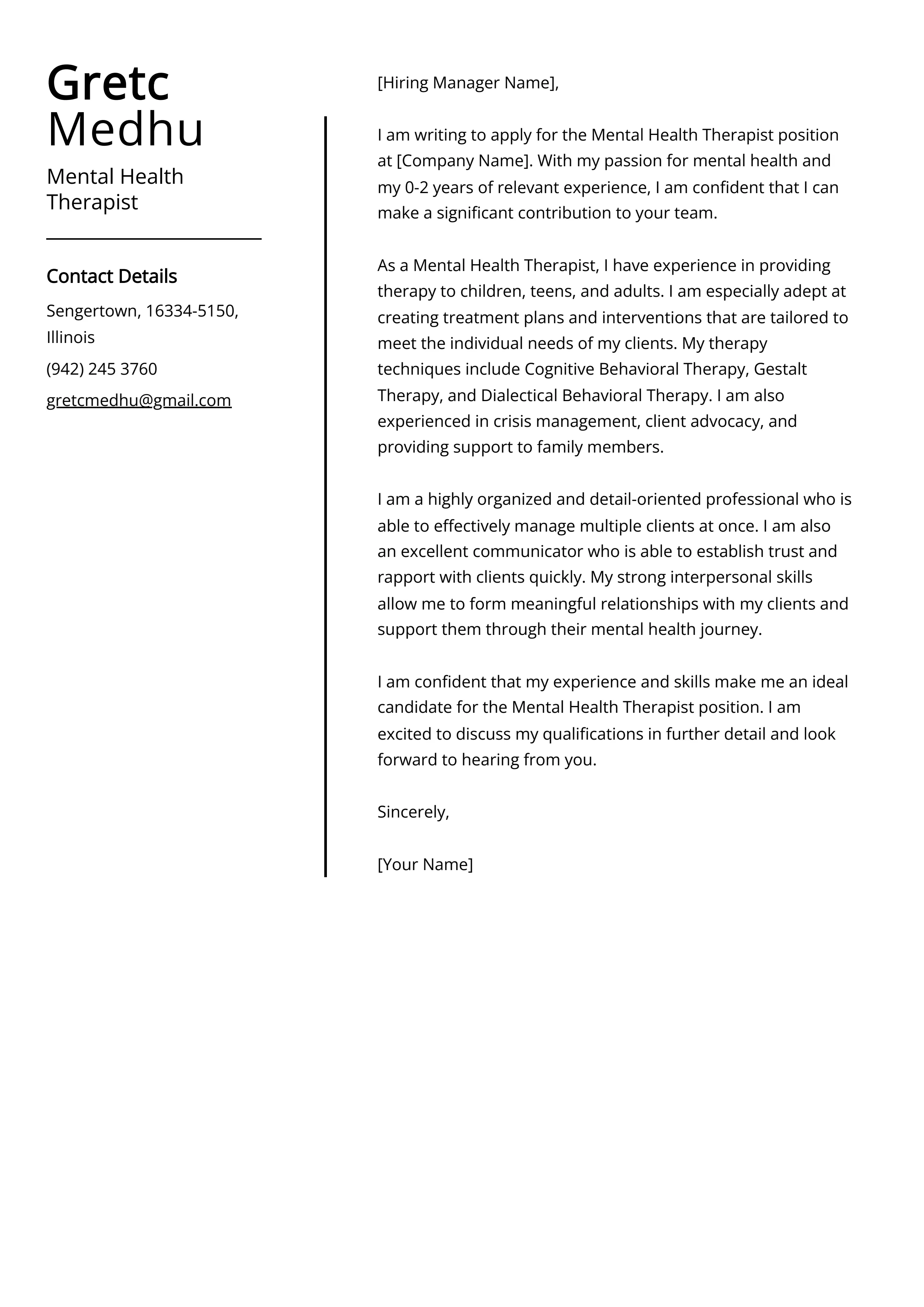Why a Cover Letter Matters for Mental Health Counseling
In the competitive field of mental health counseling, a well-crafted cover letter is your first opportunity to make a positive impression on potential employers. It’s more than just a formality; it’s a vital tool to showcase your unique qualifications, personality, and passion for helping others. A cover letter allows you to go beyond your resume, providing context and depth to your experiences, skills, and career goals. It’s your chance to demonstrate why you are the perfect fit for the specific role and the organization’s mission. A compelling cover letter can set you apart from other candidates, highlighting your genuine interest in the position and your commitment to providing excellent mental health services. Employers in this field often value empathy, communication, and a strong sense of professionalism, all of which can be effectively conveyed through a well-written cover letter. Neglecting this crucial document means missing a significant opportunity to advocate for yourself and increase your chances of securing an interview.
Highlighting Your Skills for the Role
When writing your cover letter, focus on the skills most relevant to mental health counseling. These often include active listening, empathy, strong communication, and the ability to build rapport with clients. Mention any specific therapeutic modalities you are proficient in, such as cognitive-behavioral therapy (CBT), dialectical behavior therapy (DBT), or person-centered therapy. Demonstrate your understanding of ethical guidelines, confidentiality, and cultural sensitivity. You may also want to highlight your skills in crisis intervention, assessment, and treatment planning. Provide concrete examples of how you have successfully applied these skills in previous roles or during your clinical training. For instance, describe a situation where you used active listening to help a client feel understood or how you employed CBT techniques to manage a client’s anxiety. Quantify your achievements whenever possible, such as the number of clients you have counseled or the positive outcomes you have helped them achieve. Tailor this section to match the specific requirements outlined in the job description.
Showcasing Your Experience

Your cover letter is an ideal space to elaborate on your counseling experience, detailing your role and responsibilities in previous positions or internships. Describe the types of clients you have worked with, such as individuals, families, or groups, and any specializations you may have, such as substance abuse, trauma, or eating disorders. Highlight the populations you have served, mentioning any experience with diverse cultural backgrounds or underserved communities. Specify the settings where you have practiced, like hospitals, clinics, private practices, or schools, and briefly describe your specific duties in each. For instance, mention if you led group therapy sessions, conducted individual counseling, or collaborated with a multidisciplinary team. Explain the challenges you faced and how you overcame them, showcasing your problem-solving abilities and resilience. Quantify your experience by mentioning the duration of your placements, the number of clients you served, or any notable achievements you gained. Use action verbs to describe your experiences, such as ‘provided,’ ‘facilitated,’ ‘developed,’ or ‘assessed,’ to make your descriptions more impactful and engaging.
Tailoring Your Cover Letter to the Job
Customizing your cover letter for each job application is crucial. Generic cover letters are easily identifiable and often lead to rejection. Start by carefully reading the job description and identifying the key requirements and qualifications the employer is seeking. Then, use your cover letter to directly address these requirements, providing evidence of how your skills and experiences align with their needs. If the job description emphasizes experience with a specific population or therapeutic approach, be sure to highlight your relevant experience and training. If the job requires a specific certification or license, make sure to mention it prominently. Show your genuine interest in the position by explaining why you are drawn to the role and the organization. Mention specific programs, initiatives, or values that resonate with you. Personalize your letter further by incorporating details about the organization’s mission, values, or recent achievements that demonstrate you have done your research. This level of customization shows the employer that you have taken the time to understand their needs and are genuinely interested in the opportunity.
Researching the Organization
Before submitting your cover letter, dedicate time to researching the organization you are applying to. This shows your enthusiasm and attention to detail, making your application stand out. Visit the organization’s website to learn about their mission, values, and the services they provide. Review their social media profiles and news articles to understand their recent activities and achievements. Research the organization’s leadership team, looking for insights into their approach to mental health care. Look for information on their approach to treatment, their patient demographics, and any specialties they offer. By researching the organization, you will gain a deeper understanding of their culture and goals. You can then use this information to tailor your cover letter, expressing your interest in their specific programs or values. Mentioning specific details about the organization in your letter demonstrates that you are genuinely interested in the opportunity and have taken the time to learn about them.
Formatting Your Cover Letter

The format of your cover letter is just as important as its content. A well-formatted cover letter is easy to read and professional. Start with a clear heading that includes your contact information, the date, and the employer’s information. Use a professional font, such as Times New Roman or Arial, and maintain a consistent font size throughout. Keep your letter concise, ideally one page in length. Use clear and concise language, avoiding jargon and overly complex sentences. Divide your letter into logical paragraphs with clear topic sentences to improve readability. Use bullet points or lists to highlight key skills or accomplishments. Proofread your cover letter carefully for any grammatical errors or typos. Ensure your letter has a professional layout, with sufficient margins and spacing. Ensure the letter is free of any formatting inconsistencies. By following these guidelines, you can ensure your cover letter is professional, easy to read, and accurately represents you.
Choosing the Right Tone
The tone of your cover letter should reflect your personality and your understanding of the position and organization. Aim for a professional yet personable tone. Show enthusiasm for the opportunity and your passion for mental health counseling, but avoid being overly casual or informal. Use a respectful and confident tone, showcasing your skills and experiences without being arrogant. Be authentic and genuine in your communication, letting your personality shine through. The tone of your letter should also align with the organization’s culture. Research the organization to understand their values and work environment. If the organization has a more formal atmosphere, adjust your tone accordingly. If the organization has a more relaxed environment, you can adopt a slightly more approachable tone. Maintain a consistent tone throughout your letter, ensuring it aligns with the rest of your application materials. By choosing the right tone, you will make a positive impression on the hiring manager, displaying your personality and professionalism.
Avoiding Common Mistakes in Cover Letters
Avoid these common mistakes to ensure your cover letter stands out for the right reasons. First, do not use a generic cover letter. Always tailor your letter to the specific job and organization. Avoid simply restating your resume. Instead, use the cover letter to elaborate on your experiences and highlight your qualifications. Do not include excessive jargon or overly complex language. Keep your writing clear and concise. Avoid typos and grammatical errors. Proofread your letter carefully before submitting. Do not use clichés or generic phrases. Be original and specific in your descriptions. Avoid negative statements or complaints. Focus on your strengths and achievements. Do not underestimate the importance of formatting. Ensure your cover letter is well-organized and easy to read. Finally, do not submit a cover letter without including contact information. Always provide a way for the employer to reach you. By avoiding these mistakes, you will show the employer you are professional and detail-oriented, improving your chances of getting noticed.
Writing a Strong Opening

The opening of your cover letter is your first opportunity to grab the hiring manager’s attention. It is vital to make a strong first impression. Start by addressing the hiring manager by name, if possible, and show that you have done your research. Immediately state the position you are applying for. Clearly state why you are interested in the role and the organization. Highlight something specific about the role or the organization that excites you. You can mention a recent achievement or initiative that resonates with your values. Briefly summarize your key qualifications and experiences, setting the stage for the rest of the letter. Express your enthusiasm and confidence in your ability to contribute to their team. Avoid using generic opening lines, such as ‘I am writing to express my interest in the position.’ Instead, create a compelling opening that immediately captures the reader’s attention. A strong opening will entice the hiring manager to continue reading and learn more about your qualifications.
Crafting a Powerful Closing
Your closing should reiterate your interest in the position and encourage the hiring manager to contact you. Thank the hiring manager for their time and consideration. Reiterate your enthusiasm for the role and the organization. Summarize your key qualifications and experiences. End with a clear call to action, such as, ‘I am eager to discuss my qualifications further in an interview.’ Provide your contact information again, including your phone number and email address. Use a professional closing, such as ‘Sincerely’ or ‘Best regards.’ Proofread your closing carefully for any errors. Make sure your closing is memorable, leaving a positive impression on the hiring manager. A strong closing reinforces your interest and increases your chances of securing an interview. The closing is your final opportunity to make a positive impression and leave the hiring manager with a lasting image of your skills and dedication.
